General
Makerere University Hospital iTECH Project Positions: Data Manager, Data Officer & Study Nurse
Published
2 years agoon
By
Mak Editor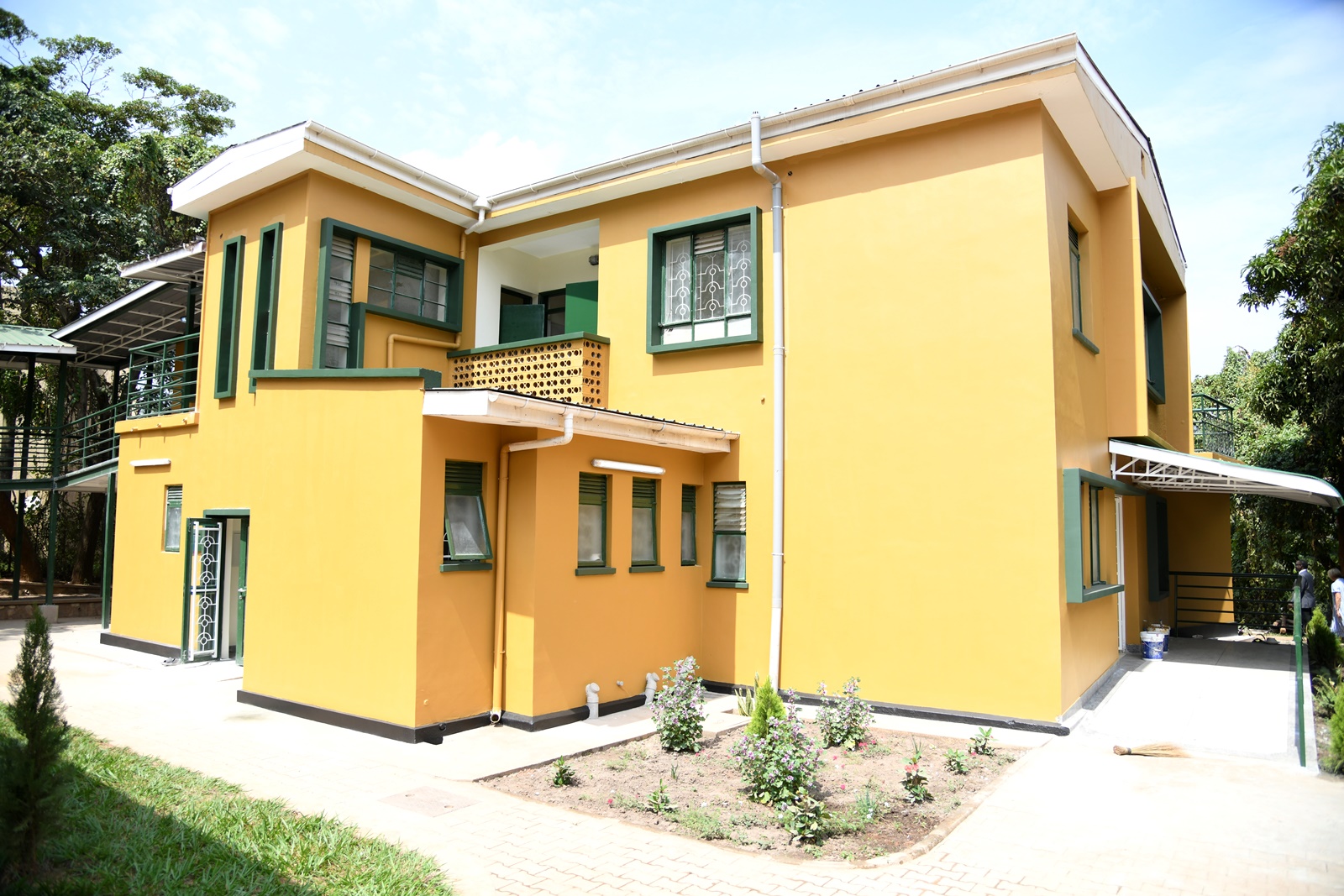
Makerere University Hospital seeks to recruit suitable candidates for the following positions; Data Manager, Data Officer and a Study nurse. Makerere University Hospital received funding from Wellcome Leap, In Utero Program to support implementation of the “Stillbirth in High Burden Settings: Ample Room for Improvement Using Biomarkers and Ultrasound Technologies” (iTECH) project. The iTECH project aims to develop novel clinical tools for use to diagnose and manage high-risk pregnant women and reduce the burden of stillbirths in Uganda, sub-Saharan Africa, and globally.
Available Position: Data Manager (01)
Duty Station: Kampala
Engagement: Full Time
Reporting to: Project Manager
Job Summary:
The Data Manager will oversee the development and implementation of strong data management. He/she will implement efficient ways to collate, organize, store and analyze data with attention to security and confidentiality.
Key Duties and Responsibilities:
- Participate in the creation and enforcement of policies and guidelines for effective data management.
- Alongside the QA and QC manager, facilitate site level data quality assessment, auditing and verification for improvement.
- Participate in the collection, cleaning, validation and maintenance of high-quality research data.
- Use a variety of advanced statistical software, methods, and techniques to gather, analyze, and interpret research data to derive useful information for research data;
- Advise and assists in the development of inferences and conclusions, as appropriate.
- Write and execute statistical methods and analysis sections of protocols, reports and peer-reviewed publications
- Design templates and develop specifications for status reports, analysis tables, graphs, and data listings for use in research publications and ad hoc reporting.
- Participate in the process of data sharing with project team and external stakeholders.
- Assist with reports and data extraction when needed from the integrated database in order to track recruitment and retention of study participants.
- Monitor and analyze information and data systems and evaluate their performance to discover ways of enhancing them (new technologies, upgrades etc.)
- Troubleshoot data-related problems and authorize maintenance or modifications.
- Participate in the review of the data management plan, maintain the data management plan throughout lifecycle of projects and ensure data management plan is followed according to iTECH project data requirements/needs.
- Maintenance of study database with regular feedback on occurrences and how these were rectified.
- Assist in defining and/or create data listings, summary table validation, data specifications and/or process data transfers in preparation for statistical review and/or data management audit.
- Coordinate the archiving of databases and related documents. Verify data in accordance with the study data management standard operating procedures (SOPs).
- Respond to requests for standard reports as required in a timely manner.
Qualifications, Skills and Experience:
- MUST have a Master’s degree in Biostatistics or Statistics or Clinical Epidemiology or Statistical Epidemiology or related field, with significant experience in Medical Sciences or public health research and data analysis.
- MUST have a strong understanding of databases and data analysis
- Good analytical thinking and ability to interpret epidemiological data
- At least one year of progressive experience in data management including designing databases, data collection, analysis and presentation.
- Knowledge of common Statistical analysis and database management packages including STATA, R, SPSS, Redcap, Open Data Kit (ODK)
- Up-to-date training in Good Clinical Practice and Human Subjects protection Research.
- Should be dynamic and flexible to deliver on strict program deadlines
- Possess excellent troubleshooting skills.
- Able to work under pressure
Available Positions: Data Officer (02)
Duty Station: Hoima and Kampala
Engagement: Full Time
Reporting to: Site Manager/ Data Manager.
Job Summary:
The data officer will provide ongoing technical assistance to the project and facility team in recording and management of project-related data in line with the study guidelines.
She/he will also assist the Data Manager in the entry, cleaning and analysis of data captured by the study database.
Key Responsibilities:
- Ensure weekly back up of study data including ultrasound, maternal hemodynamics, laboratory, placenta histology and routine clinical data.
- Support with study data entry.
- Help the site teams to project participant recruitment and follow-up numbers together with the data manager.
- Handle labelling of study participant forms including study informed consent forms and lab request forms by assigning study IDs
- Perform labelling of ultrasound and maternal hemodynamic profiles, and any other data as guided by the line supervisor
- Perform data export from the study equipment at the sites.
- Help with participant tracking for follow up study visits and deliveries
- Support the site study team in the timely compilation of daily, weekly and monthly study reports
- Any other duties as may reasonably be assigned by the data manager and project manager
Qualifications, Skills and Experience:
- The applicant must hold a Bachelor’s Degree in Information Technology/ Computer science.
- Experience in medical data management is an added advantage.
- Should be dynamic and flexible to deliver on strict program timelines
- Understands client confidentiality and exhibits a high level of ethical conduct
- Has basic computer literacy including word processing, excel, internet and PowerPoint.
- Highly organised and pays attention to detail
- Good interpersonal skills and ability to work in a team
- Should have analytical abilities
- Good communication skills
Available Position: Study nurse (01)
Duty Station: Hoima
Engagement: Full Time
Reporting to: Site Manager and Project Manager
Job summary:
The Study nurse will be responsible for recruitment of study participants and administering of required study related procedures to these participants.
Key Duties and Responsibilities:
- Participate in protocol, standard operating procedures (SOPs) or any other study trainings
- Participate in study site entry visits and engage with management of study participants. These include but not limited to patient enrolment, as guided by the protocol.
- Obtain written informed consent for those eligible and are willing to participate in the study
- Administer all study procedures like sample collection, data collection and entry, patient follow-up and treatment to patients recruited into the study as guided by the protocol and in accordance to set standards of Good Clinical Practice
- Perform patient safety monitoring for any adverse events, offer care and referral as needed
- Provide counselling and pyscho-social support to study participants where needed
- Conduct assessment of maternal hemodynamics and maternal hemodynamics data collection under guidance of coordinator.
- Perform first-level quality assurance and quality control (QA / QC) to ensure all fields in the consent forms and case report forms (CRFs) are complete and accurate
- Offer support to the community health workers and research assistants for the follow- up of study participants.
- Assist in generating study progress reports as needed
- Perform any other duties assigned by the Operations Research officer, Project Manager and principal Investigator, as deemed necessary for study activities
Required Qualifications, experience, skills and attributes:
- Minimum of a Bachelor in Nursing from a recognized institution.
- Currently registered with the Uganda Nurses and Midwives Council and an up-to-date Practicing License.
- Up-to-date training in Good Clinical Practice and Human Subjects Protection Research.
- Previous experience with working in a research environment will be an added advantage
- Ability to speak the indigenous languages spoken in the western region will be an added advantage
How to apply:
All applications must be submitted to the email: itechprojectug@gmail.com before Friday 4th March 2024 at 5:00PM
Additional Information
- The subject line of your email should be: “Application- (indicate the position) – iTECH Project”
- Submit your application (1-page cover letter, 3 pages resume including two referees, and relevant supporting documents) as ONE PDF
- PDF’s exceeding 5MBs will be considered ineligible.
- Submission of incomplete or inaccurate documents will render the applicant ineligible for consideration for the job opening.
- Applications cannot be amended following submission.
- Only shortlisted candidates will be contacted for interviews.
- The interviews will be held on 11th March 2024.
You may like
-


Makerere Explores Strategic Industry Partnership with Psalms Food Industries to Strengthen Manufacturing Innovation
-


Makerere Graduation Underscores Investment in Africa’s Public Health Capacity
-


Botswana Delegation Visits Makerere’s Public Investment Management Centre to Study Sustainable Training Model
-


Makerere University commemorates 13 transformative years of partnership with Mastercard Foundation
-


200 UVTAB students graduate: CEES emphasizes Skills, Integrity and Community Impact
-


Mak News Magazine: February 2026
General
Makerere Explores Strategic Industry Partnership with Psalms Food Industries to Strengthen Manufacturing Innovation
Published
11 hours agoon
March 4, 2026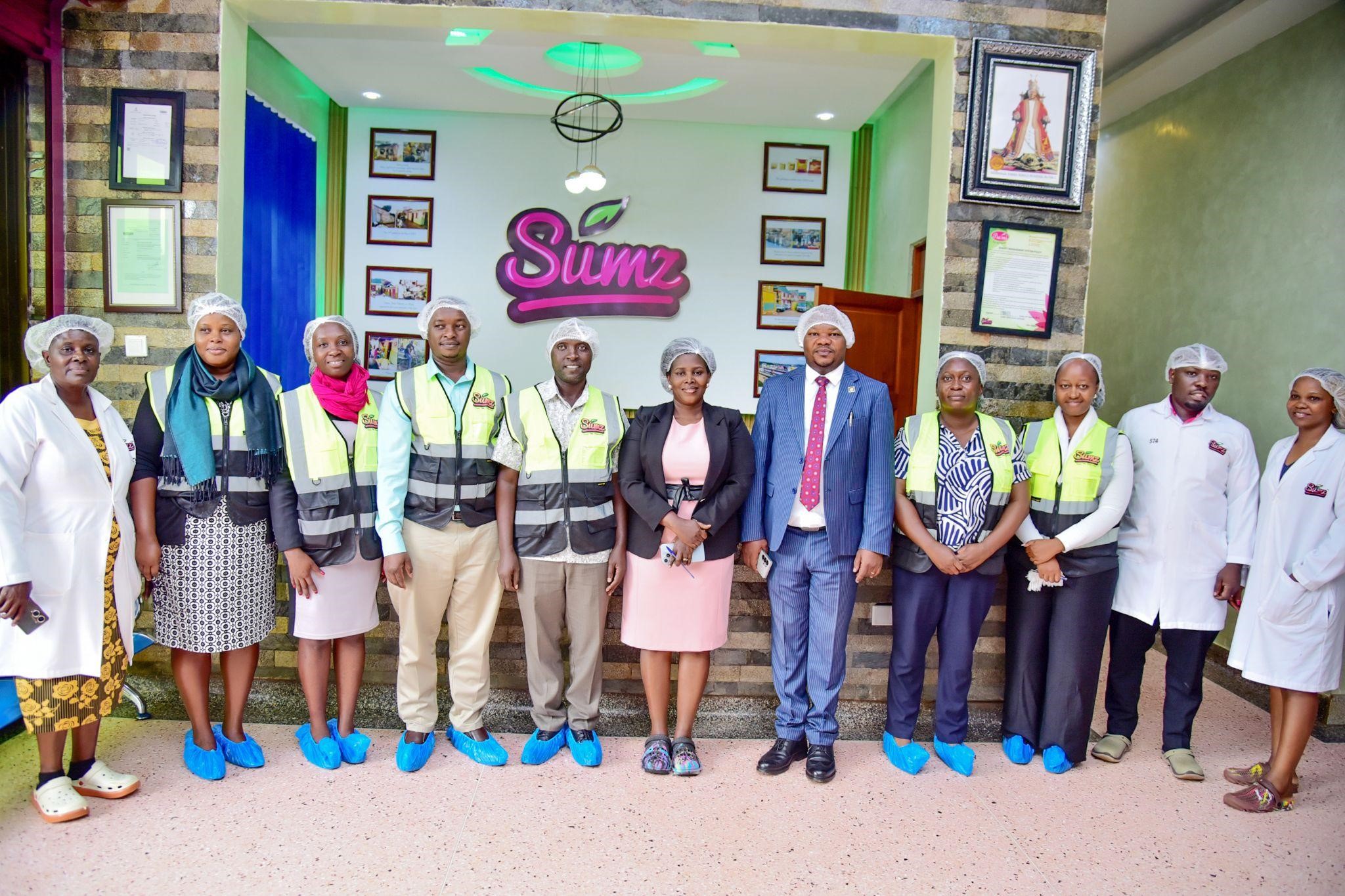
On 2nd March, 2026, representatives from the Advancement Office, the College of Business and Management Sciences and the University Innovation Pod visited Psalms Food Industries to discuss a prospective partnership aimed at strengthening university–industry collaboration in manufacturing, research, innovation, and skills development.
Psalms Food Industries, a homegrown snacks innovation and manufacturing company, operates three major brands, namely, Sumz, Afrikan Harvest and Krunchables, which have grown to a range of 37 products and target the introduction of five new products annually. The company distributes products across Kenya, Rwanda, the Democratic Republic of Congo, South Sudan, and, recently, Tanzania. As a labour of love, the idea of producing snacks was born during the honeymoon of Mr and Mrs Ngabirano, who now run Psalms Food Industries side by side.
Dr. Denis Ngabirano, CEO and Co-Founder of Psalms Food Industries, during the meeting, described the company as “a snacks innovation house, with all our products developed in-house.” He noted.
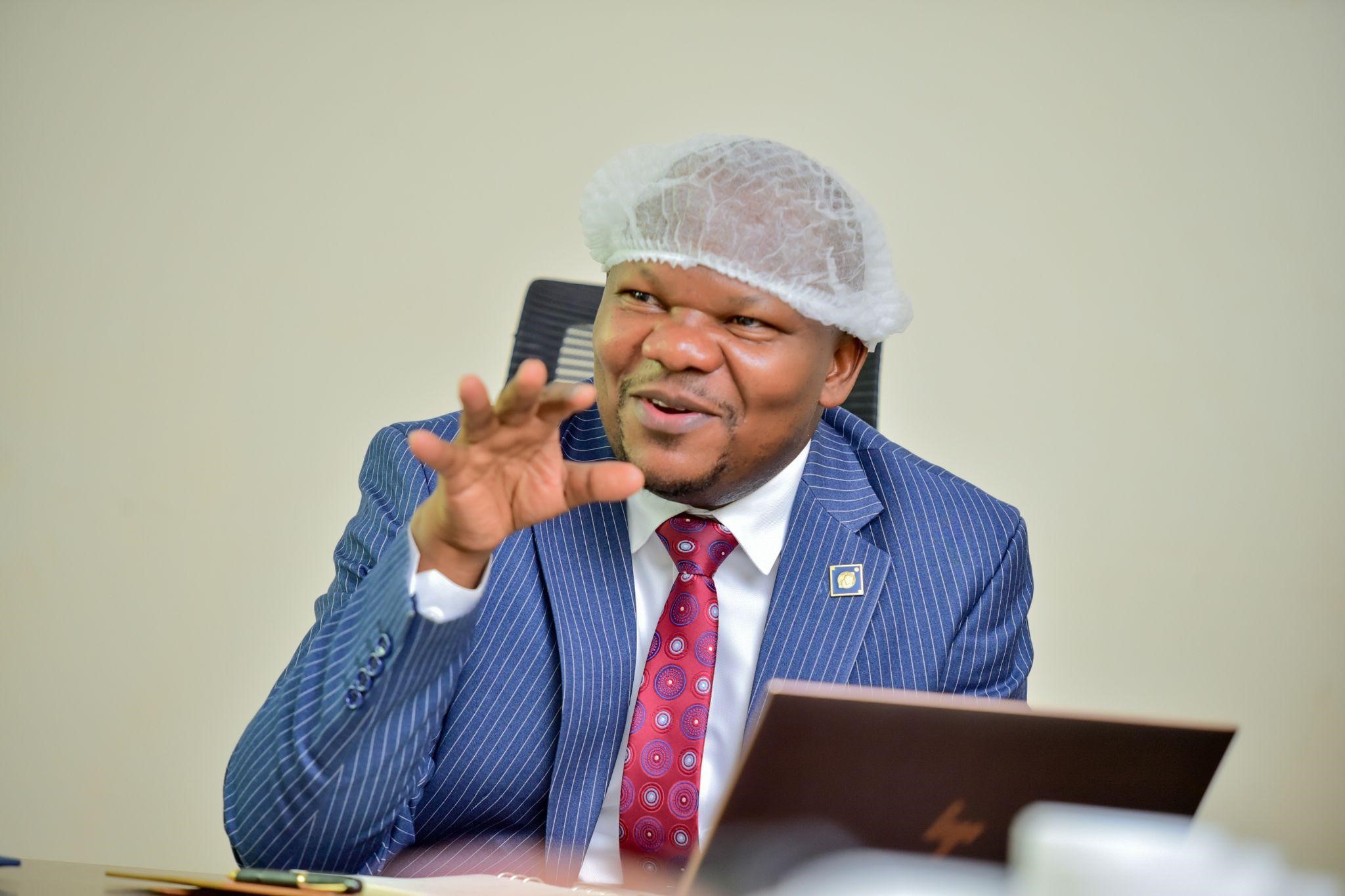
He emphasised the company’s commitment to quality assurance and consumer-centred research, noting that Psalms conducts surveys and gathers customer feedback to inform product development, supported by an internal microbiology and chemistry laboratory.
Dr. Denis Ngabirano noted that the company had only recently introduced two brands, “Afrikan Harvest for it’s health conscious clientele and Kruchables for it’s volume centric clientele.
“Afrikan Harvest has no additives, it is a brand for health-focused consumers,” he explained, while highlighting the differentiated positioning of their product lines. “Sumz is our premium brand, and Krunchables focuses on volume.”
Student-Centered Experiential Learning
A key focus of the meeting was structured experiential learning for students across disciplines. Potential areas of collaboration include internships, graduate trainee pathways, and hands-on exposure within Psalms’ incubation and production facilities.
The proposed engagement spans multiple fields, including environmental sciences, engineering, procurement and logistics, finance and accounting, quality control, production and manufacturing, human resource management, marketing, and international business.
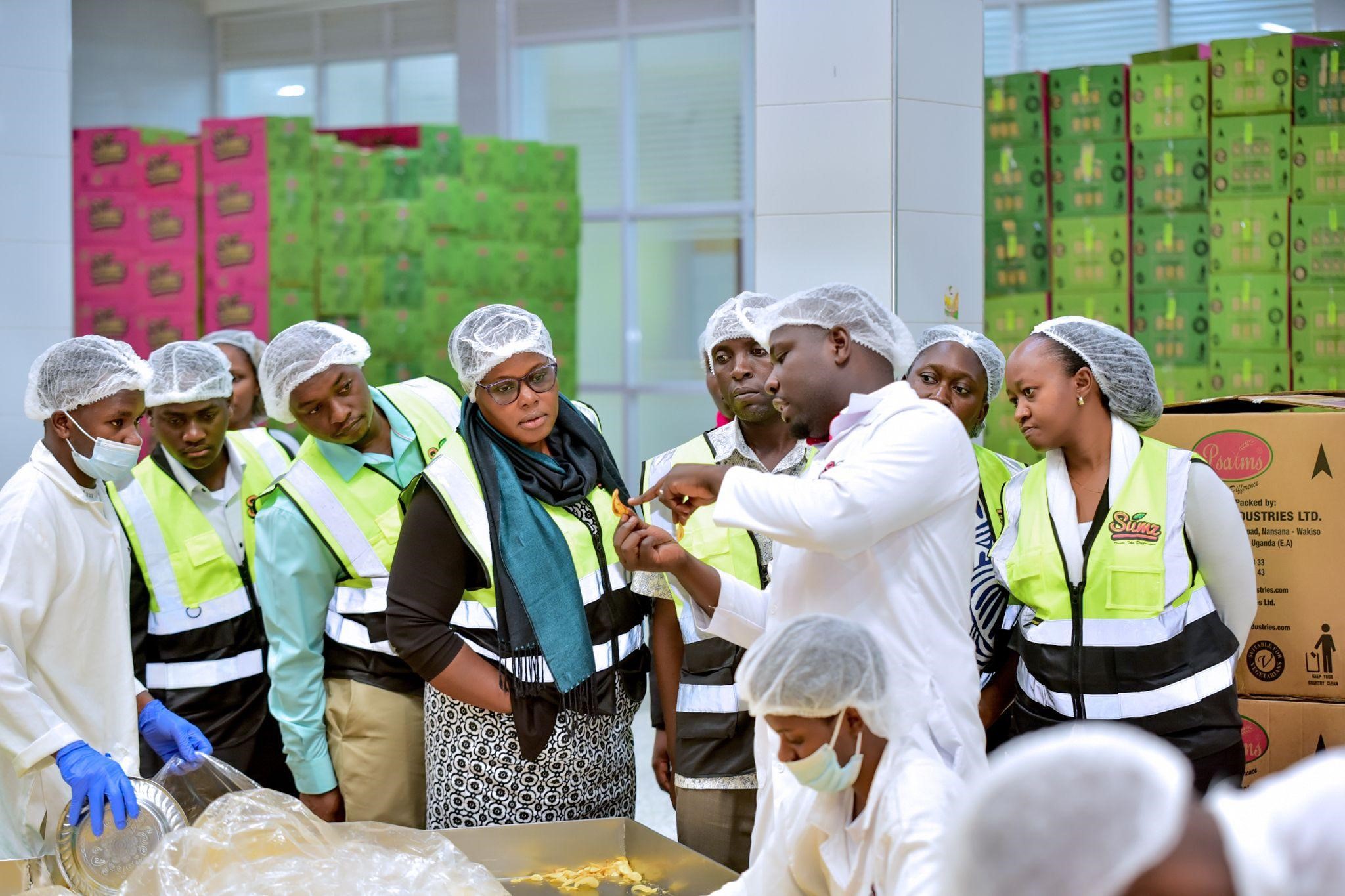
The partnership could provide students with direct exposure to real-time production systems, standard operating procedures (SOPs), and quality assurance frameworks, strengthening the practical relevance of their academic training.
Among the innovative ideas discussed was a potential competition involving students from the Fine Art and Industrial Design disciplines to redesign packaging for selected Sumz products. The proposal would allow top designs to be commercially adopted, creating a direct bridge between creativity, intellectual property development, and industrial application.
Research, Innovation and Commercialisation
Both institutions expressed interest in joint applied research initiatives, particularly in process optimisation, data analytics for manufacturing efficiency, product improvement, and sustainable production systems.
Opportunities were also discussed around collaborative research in machine design, crop development for snack processing, and factory energy solutions, areas that not only benefit Psalms but have broader implications for Uganda’s manufacturing sector.
The engagement further highlighted potential linkages with the University’s innovation and commercialisation structures, including the University Innovation Pod (UNIPOD), to support co-creation and scaling of student-led innovations.
Mr Awel Uwihanganye, Chief Advancement Officer at Makerere University, proposed strengthening the engagement through structured programming, including a planned collaboration between the University’s innovation Hub and the upcoming incubation Hub at Psalms Food Industries, particularly to support the commercialisation of research outcomes for both students and staff.
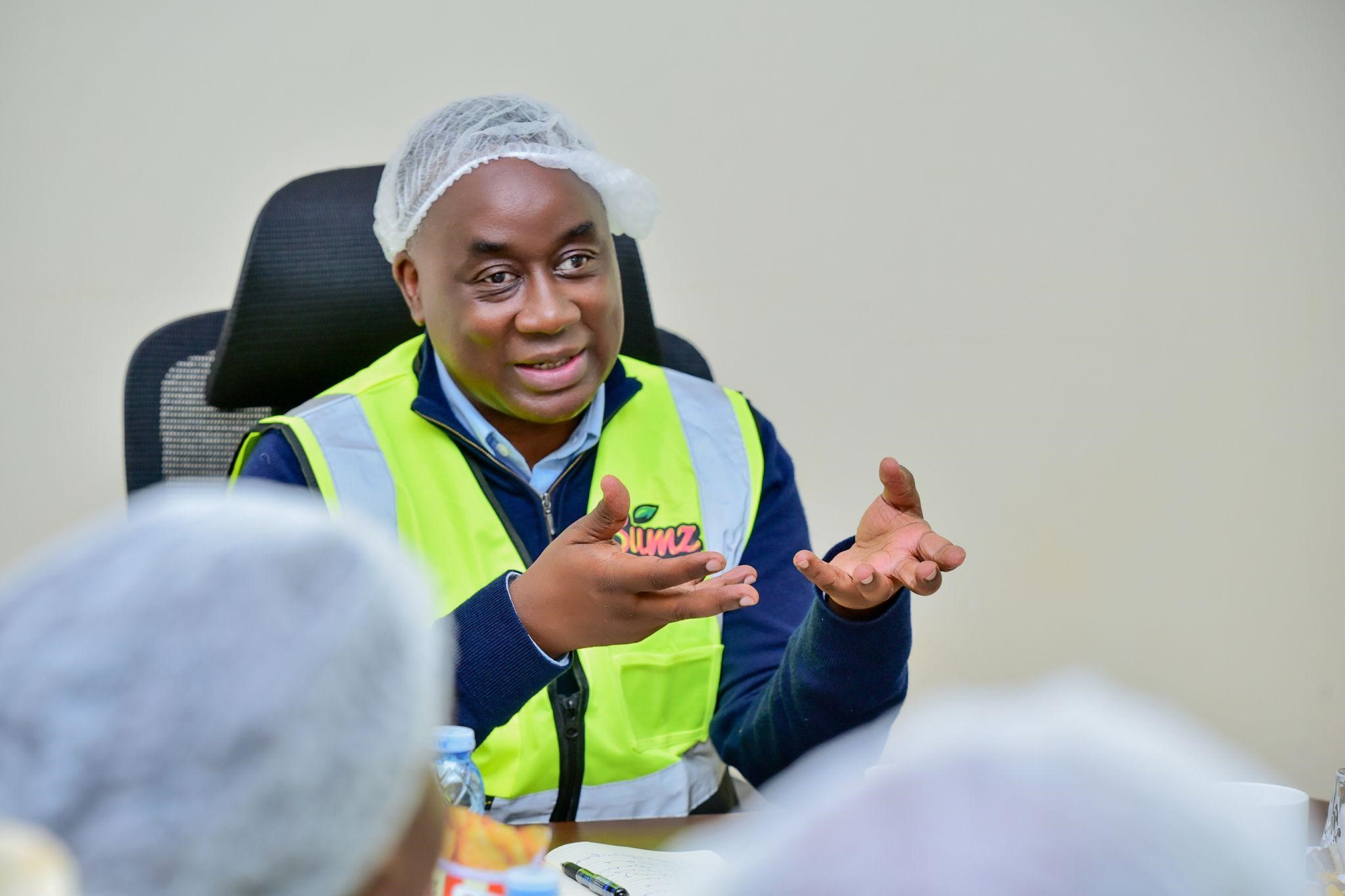
Curriculum Co-Creation and Staff Exchange
Beyond student placements, discussions also focused on co-developing academic content that responds more directly to industry needs, particularly within the manufacturing value chain.
Proposals included guest lectures by industry practitioners, staff exchange programmes to expose academic staff to factory operations, and tailored short courses for Psalms staff based on identified skills gaps.
Dr. Jude Mugarura, Head of the Department of Marketing and Management at COBAMS, emphasised the importance of embedding the partnership within academic programming. He proposed “internships for students in HR, marketing, international business, accounting and finance,” as well as staff exchanges to give University staff hands-on exposure to manufacturing operations.
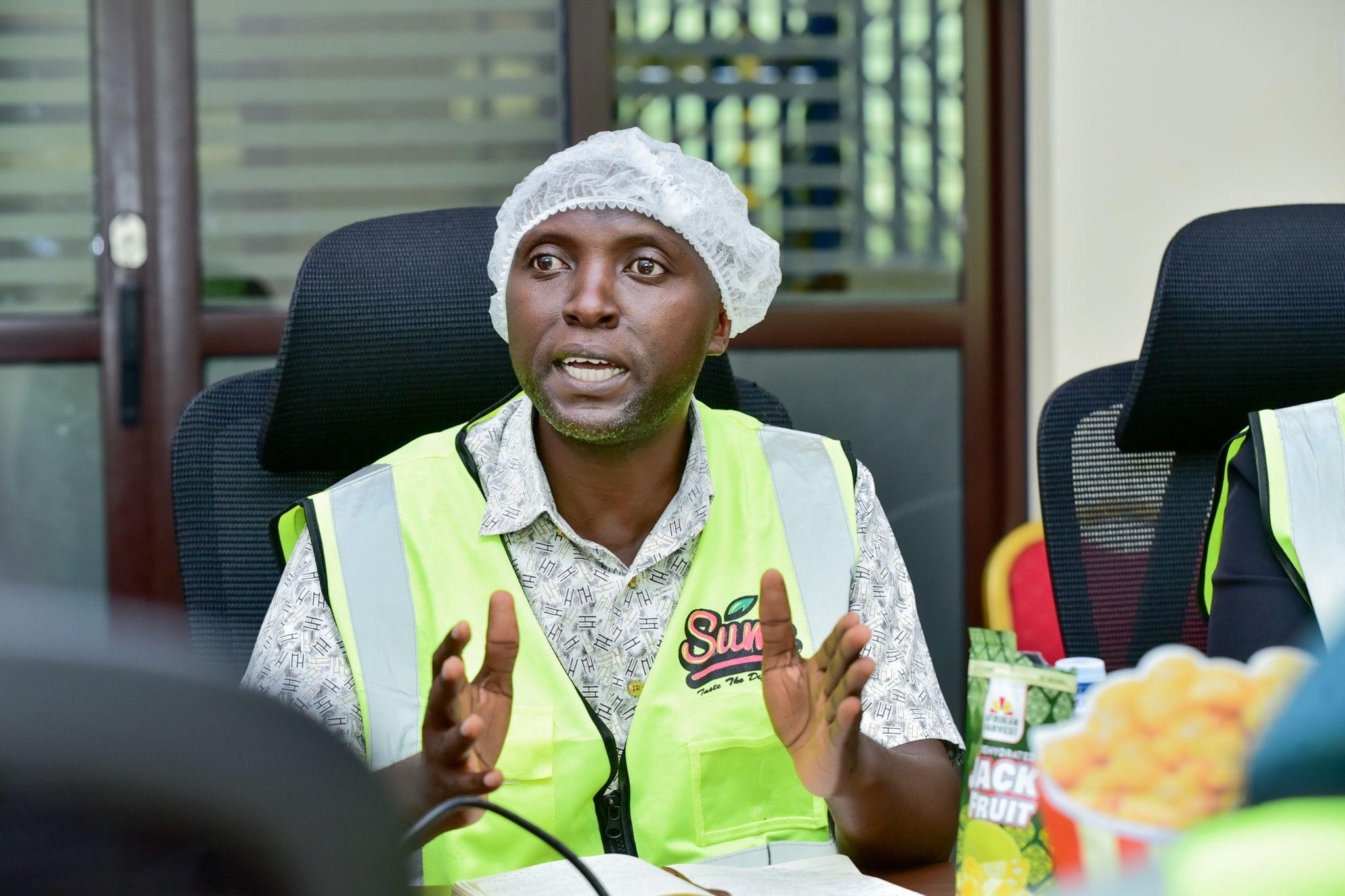
He further suggested specialised courses tailored to the factory’s needs and attachment of research students interested in manufacturing. Such collaboration would contribute to curriculum responsiveness and ensure that graduates are equipped with market-relevant competencies.
Strengthening University–Industry Linkages
The engagement reflects Makerere University’s continued commitment to strengthening partnerships that bridge knowledge generation and real-sector application.
Both institutions expressed a shared vision of building a structured, mutually beneficial collaboration that integrates research, innovation, skills development, and enterprise growth, positioning the University as a key knowledge partner in Uganda’s manufacturing transformation.
Discussions remain ongoing as both parties refine priority areas for formalisation.
Caroline Kainomugisha is the Communications Officer, Advancement Office.
General
Makerere University commemorates 13 transformative years of partnership with Mastercard Foundation
Published
2 days agoon
March 2, 2026
On Friday, 27th February 2026, Makerere University proudly celebrated 13 years of a significant partnership with the Mastercard Foundation, a prestigious independent organisation headquartered in Toronto, Canada. Since its inception in 2013 with the launch of the Scholars Program-currently headed by Prof. Justine Namaalwa, this collaboration has grown significantly, expanding to include two additional initiatives: The E-learning Initiative-headed by Prof. Paul Muyinda Birevu and the Africa Climate Collaborative-headed by Prof. Gorretie Nabanoga. This long-term partnership underscores the shared commitment to fostering education, innovation, and sustainability in Uganda and across Africa.
The colourful event coincided with the 76th Graduation Ceremony, during which Makerere University honoured Ms. Reeta Roy, the Founding President and CEO of the Mastercard Foundation, with an honorary Doctor of Laws.

In her commencement speech, Ms. Roy thanked Makerere University for considering a partnership with the Mastercard Foundation and for conferring upon her a prestigious honorary award.
“Mastercard Foundation is honoured to collaborate with this esteemed university, and I appreciate the recognition through this award. I am excited to be associated with Makerere University and look forward to actively embodying its values. Joining the broader community of alumni from this distinguished institution is a privilege, and I am eager to contribute to its legacy,” stated Ms. Roy.

During the reception in honour of Ms. Roy, the Chairperson of Makerere University Council, Dr. Lorna Magara, acknowledged the invaluable support from the Mastercard Foundation. She emphasised the profound impact of the Foundation’s various initiatives, particularly the scholarships for disadvantaged youth, which enable them to access higher education and opportunities that might have otherwise been beyond their reach.
“On behalf of the Makerere University Council and the broader University community, I extend our sincere gratitude to Mastercard Foundation for its commitment to collaborating with Makerere University in various endeavours, especially for providing scholarships to our underprivileged young people who would never have stepped inside a lecture room at the University.” Dr. Magara stated.

Dr. Magara, in a special way, thanked Ms. Roy for her transformative leadership and unwavering commitment to supporting young people in Africa, citing her efforts to ensure young people get their voices heard.
“As a university, our business is with young people. We are therefore committed to providing the environment and education that deliver meaningful pathways. We will provide an environment that ensures young people have a voice and agency to create meaningful change in society.” Dr. Magara pledged.

Dr. Magara further congratulated Ms. Roy on her honorary Doctor of Laws from Makerere University, noting that it is the university’s highest honour for individuals who have excelled in their careers.
“On behalf of the Makerere University community, I would like to extend my heartfelt congratulations on your honorary Doctor of Laws. This esteemed recognition represents the highest honour our institution can bestow on individuals who have demonstrated exceptional achievement and excellence across various facets of their career.” Dr. Magara remarked.
Prof. Justine Namaalwa, the Program Director of the Mastercard Foundation Scholars Program and the Coordinator for all Mastercard Foundation Initiatives at Makerere University, expressed her appreciation for the thirteen-year collaboration between Makerere University and the Mastercard Foundation. She highlighted that the partnership had yielded significant, impactful results.

“In 2013, Makerere University partnered with the Mastercard Foundation to educate the next generation of transformative African leaders who can positively impact their lives, their communities, and the economies of Africa. The partnership has had a significant impact. I thank the University Management and the Foundation team for this visionary collaboration,” remarked Prof. Namaalwa.
Prof. Namaalwa articulated that the partnership with the Mastercard Foundation is primarily focused on empowering young people as agents of change for transformational leadership in Africa. She presented compelling statistics demonstrating the positive impact of the scholars’ program, highlighting the success of individuals who have completed their education and their subsequent professional experiences after university graduation.

“This partnership focuses on young people, aiming to create positive change in their lives. To date, the Scholars Program has graduated 974 alumni, with 48% securing formal employment, 18% starting their own businesses, 8% participating in internships, and 5% pursuing further education. Overall, 72% of Scholar alumni are actively engaged in employment or entrepreneurship,” Prof. Namaalwa stated.
The colourful event showcased a dynamic array of activities that highlighted the entrepreneurial spirit of Scholars and alumni from the Mastercard Foundation at Makerere University. Attendees enjoyed a mini-exhibition featuring innovative products from these ventures.

A video documentary illustrated the positive impact of the three Mastercard Foundation initiatives. The event also featured inspiring poetry recitations by Scholars and a lively atmosphere of music and dance, creating an engaging and memorable experience for all participants.
The high-level event was attended by senior University officials, led by the Chairperson of Council, Dr. Lorna Magara; the Vice-Chancellor, Prof. Barnabas Nawangwe; the Vice-Chancellor, Academic Affairs, Prof. Sarah Ssali, Deputy, and the Ag. Deputy Vice-Chancellor, Finance and Administration Prof. Winston Tumps Ireeta. Mr Yusuf Kiranda, the University Secretary; and Prof. Buyinza Mukadasi, the Academic Registrar, Chancellor Emeritus-Prof. Ezra Suruma, former Chairperson of the Steering Committee of Mastercard Foundation Scholars Program-Prof. Umar Kakumba, and the Deputy Executive Secretary, RUFORUM, and former Program Coordinator of the Scholars Program at Makerere University-Dr. Florence Nakayiwa, among many other officials graced the function.

The event was also graced by a high-level delegation from the Mastercard Foundation, led by Ms. Reeta Roy, the Founding President of the Foundation, and included the Mastercard Foundation Teams from the Country offices in Kigali, Nairobi, and Kampala; the Program partners; the Mentors, Scholars and alumni; as well as the Program staff of the three Mastercard Foundation Initiatives at Makerere University.
At the end of the event, Makerere University honoured Ms. Reeta Roy with University memorabilia, including a pencil-drawn portrait, a pencil-drawn photo of the Ivory Tower, and other Ugandan crafts. Ms. Roy cut a graduation cake together with the 10 graduates of the 76th graduation ceremony from the Mastercard Foundation Scholars Program.
Bernard Buteera is the Principal Public Relations Officer for the Mastercard Foundation Scholars Program at Makerere University.

It is with great pleasure that I welcome you to this edition of Mak News Magazine, a publication that continues to chronicle Makerere University’s journey as a centre of academic excellence, innovation, and societal transformation.
The stories featured in this issue vividly demonstrate Makerere’s unwavering commitment to addressing national, regional, and global challenges through research, partnerships, and people-centred solutions. They reflect a university that is deeply engaged with society, one that applies knowledge not only to advance scholarship, but also to improve lives.
A recurring theme in this edition is innovation for resilience and inclusion. From the College of Agricultural and Environmental Sciences’ Healthy Soy Initiative combating child malnutrition amid climate change, to the cutting-edge work of CEDAT’s Team Green Minds integrating IoT into agriculture, Makerere continues to harness science and technology to respond to pressing development needs. Equally inspiring is the College of Natural Sciences’ success in securing international funding to scale up fish processing technologies, with a deliberate focus on empowering women and strengthening livelihoods.
This issue also highlights Makerere’s growing role in advancing health and wellbeing. The launch of the Early Intervention Psychiatry Services Clinic at Makerere University Hospital marks an important step in strengthening mental health services, while the Hospital’s transformation from a modest sickbay into a centre of excellence stands as a testament to decades of strategic investment, dedication, and service to the nation.
Our commitment to education access and global engagement is equally evident. Strategic partnerships, such as that between the College of Education and External Studies and the Uganda Vocational and Technical Assessment Board, are expanding pathways to quality education. The establishment of the first-ever United States Studies Centre in the Great Lakes Region positions Makerere as a hub for dialogue, research, and policy engagement on global affairs. We also celebrate our vibrant international community, with graduates drawn from 67 nationalities—affirming Makerere’s status as a truly global university.
This edition further showcases initiatives that ensure long-term institutional sustainability, including the launch of the CoCIS Endowment Fund, infrastructure developments such as the modern hostel at Buyana Farm, and transformative programmes supported by the Mastercard Foundation that continue to empower young people across the continent.
As you read through these pages, I invite you to reflect on the collective effort of our students, staff, alumni, partners, and supporters whose contributions make these achievements possible. Together, we continue to shape Makerere University as a place where knowledge serves humanity.
I wish you an engaging and inspiring read.
Prof. Barnabas Nawangwe
VICE CHANCELLOR
Trending
-

 Humanities & Social Sciences1 week ago
Humanities & Social Sciences1 week agoMeet Najjuka Whitney, The Girl Who Missed Law and Found Her Voice
-

 General1 week ago
General1 week ago76th Graduation Highlights
-

 Agriculture & Environment2 weeks ago
Agriculture & Environment2 weeks agoUganda Martyrs Namugongo Students Turn Organic Waste into Soap in an Innovative School Project on Sustainable Waste Management
-

 Health2 weeks ago
Health2 weeks agoMakerere University School of Public Health Graduates First Cohort of Cost-Effectiveness Analysis Short Course
-

 Agriculture & Environment1 week ago
Agriculture & Environment1 week agoCAES Presents Overall Best Performing Student in the Sciences & a Record 28 PhDs at the 76th Graduation Ceremony
